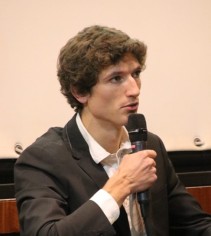Aurélien Bigo

Researcher on the energy transition of transport
Aurélien Bigo is a researcher on the energy transition of transport. At the end of 2020, he defended a thesis on the subject "Transport facing the challenge of energy transition. Explorations between past and future, technology and sobriety, acceleration and slowdown", which studies the levers of transition in the sector in France. He then worked on the transport component of ADEME's Transition(s) 2050 scenarios, and is now an associate researcher at the Energy and Prosperity Chair.
Talk: The drivers of transport emissions in France: which interactions with ICT?
France set itself the ambitious target of reaching climate neutrality by 2050 in France, and then plans almost zero direct emission for the transportation sector in less than 30 years. The national low carbon strategy identifies 5 drivers to decarbonize the transport sector: the moderation of transport demand, modal shift, load factor optimization, energy efficiency, and carbon intensity of energy. The presentation will mainly focus on the past trends of these five drivers of emissions and the potential of these drivers in terms of transport CO2 emissions reductions by 2050. It will also discuss the role of ICT in this transition, with impacts that may be positive or not for CO2 emissions. On one hand, it may help increasing transit use, developing carsharing or bike sharing services, by improving information access, developing new apps or services. On the other hand, it may also facilitate and then increase transport demand, especially if it improves the performance and convenience of the most CO2 emitting transport modes, then leading to an increase of transport emissions.
Panel Debate: What can we learn from X-disciplinarity to effectively integrate ICT for mobility in a city?
For decades, mobility in the Global North evolved around individual motorised transportation. This form of mobility is recently becoming ``smarter,'' with autonomous transport systems and ICT support for various modes of transportation being promoted by industry players and policy makers alike. In this panel we want to discuss the role that ICT needs to play in future communities, specifically with respect to sustainably organising and maintaining mobility and mobility infrastructure. We want to focus on different facets of sustainability, including e.g. environmental sustainability, inclusion, and social aspects. We understand that a comprehensive perception of sustainable ICT for future mobility can only be developed in an x-disciplinary (i.e., multi-, trans-, and interdisciplinary) way that includes expertise far beyond the narrow realm of technology and engineering, and we want to explore how these aspects can be addressed develop the supporting ICT solutions for and with all stakeholders.
Watch the panel here !
For decades, mobility in the Global North evolved around individual motorised transportation. This form of mobility is recently becoming ``smarter,'' with autonomous transport systems and ICT support for various modes of transportation being promoted by industry players and policy makers alike. In this panel we want to discuss the role that ICT needs to play in future communities, specifically with respect to sustainably organising and maintaining mobility and mobility infrastructure. We want to focus on different facets of sustainability, including e.g. environmental sustainability, inclusion, and social aspects. We understand that a comprehensive perception of sustainable ICT for future mobility can only be developed in an x-disciplinary (i.e., multi-, trans-, and interdisciplinary) way that includes expertise far beyond the narrow realm of technology and engineering, and we want to explore how these aspects can be addressed develop the supporting ICT solutions for and with all stakeholders.
Watch the panel here !
